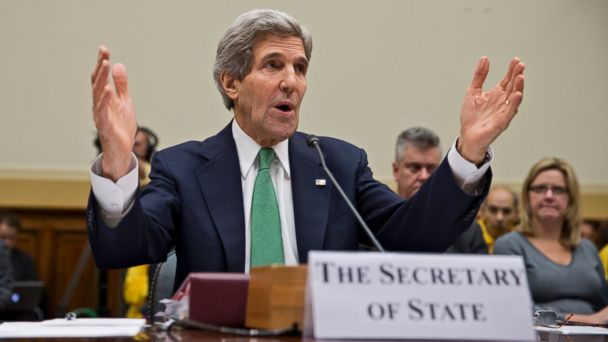Testifying on Iran Nuke Deal, John Kerry Faces Skeptical Congress

Scott Applewhite/AP Photo
The Obama administration has a long way to go in selling its Iranian nuclear deal to lawmakers.
For the first time since striking it in Geneva on Nov. 24, Secretary of State John Kerry appeared on Capitol Hill today to testify on the deal, continuing his sales pitch to a skeptical Congress. He encountered plenty of resistance - not just from Republicans, but also from fellow Democrats.
Read more: When Will the Iran Nuclear Deal Actually Start?
Case in point: Rep. Brad Sherman, D-Calif., a nine-term Democrat, told Kerry, "I was briefed by the administration on this deal and I was impressed a little bit less after I read it." and pressed for new sanctions that the administration is trying to prevent.
Rep. Juan Vargas, D-Calif., a freshman, expressed at length at the outset of his questioning his support for Kerry's 2004 presidential campaign. Then called the deal "naive."
Read more: Obama Defends Iran Deal to Israeli Policy Forum
Ranking Member Eliot Engel, D-N.Y., voiced "serious reservations" about the deal in his opening statement.
Republicans, as expected, attacked the deal with force. Rep. Matt Salmon, R-Ariz., pressed Kerry to guarantee that "not one single dollar of that new money coming in to Iran is going to be used to kill one American soldier." Kerry couldn't.
Rep. Dana Rohrabacher, R-Calif., a long-tenured foreign-policy voice in the House GOP conference, admonished Kerry for referring to Ayatollah Khamenei as "supreme leader."
"Quite frankly, that's groveling but verify," Rohrabacher said, a quip on Kerry's advertisements of a "test but verify" approach to Iran.
As expected, Kerry plugged the deal as a rollback of Iran's nuclear program that would create breathing room for negotiations, in exchange for modest sanctions relief.
"This agreement halts the progress of Iran's nuclear program - halts the progress - and rolls is back in certain places for the first time in nearly 10 years," Kerry said in his opening remarks.
"There's nothing naive about what we're doing. It is calculated. It may be wrong. You may find that it's a miscalculation, but it's not miscalculation based on naivete. We understand the dangers. We understand the risks. We understand how critical this is and how high the stakes are," Kerry said later, responding to criticism.
"I'm not saying never," Kerry said of passing new sanctions. "If this doesn't work, we're coming back and asking you for more. I'm just saying not right now."
Kerry called it a "very delicate diplomatic moment" with Iran.
On Wednesday, the secretary of state will return to the Hill to brief senators on the Iran deal behind closed doors, with Treasury Secretary Jack Lew.
Congressional cooperation will be important if the deal is to succeed, and the administration has reached a crossroads with lawmakers.
Both Republicans and Democrats have pushed for new sanctions on Iran - or at least a bill that would guarantee new sanctions at the end of the six-month "first step" agreement if a broader deal isn't reached and would trigger new sanctions if Iran doesn't hold up its promises under the interim agreement.
But under the Geneva agreement, any new oil sanctions would invalidate the deal, and Iranian Foreign Minister Javad Zarif told Time Magazine this week that the deal is off if Congress imposes new sanctions - even if they're delayed for six months. It's unclear what would happen if Congress were to pass new sanctions and President Obama were to veto them.
The Senate will likely be the more critical battleground. With Democrats in control, it would be harder for sanctions backers to gain the two-thirds majority needed to override a presidential veto.
For now, the Senate Banking Committee, which is responsible for passing sanctions legislation, will hold off on moving forward with a new bill.
"The President and Secretary Kerry have made a strong case for a pause in Congressional action on new Iran sanctions, so I am inclined to support their request and hold off on Committee action for now. I'll have more to say on this at Thursday's Banking Committee hearing," committee Chairman Tim Johnson, D-S.D., said in a statement today.
The Senate Banking Committee will hold a hearing on Thursday to examine the nuclear agreement reached last month, featuring testimony from Wendy Sherman, the undersecretary of political affairs at the State Department, and David Cohen, the agency's undersecretary for terrorism and financial intelligence.
In the House. Kerry told lawmakers today that new sanctions - even delayed ones - would not only upset Iran but could spook world powers from holding to the international sanctions regime.
"Our partners, if we pass them now, could get squirrelly on the whole idea of sanctions," Kerry said.
"We told them we would not do it," Kerry said of Iran, noting that "our partners don't expect us to" pass new sanctions.
Kerry also revealed he expects the Geneva deal to take effect soon.
Although it's been three weeks since Iran and the United Nations' P5+1 reached it, the agreement hasn't actually been implemented. Iran has yet to submit to additional monitoring, and the U.S and world powers have yet to roll back sanctions. Technical teams met in Vienna on Monday to discuss implementation, but until today the State Department had provided no guidance on when that final haggling might be over with.
The deal will take effect "in the next weeks," Kerry said.
This post has been updated to reflect that Rep. Matt Salmon is from Arizona, not Utah.